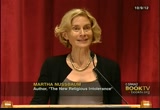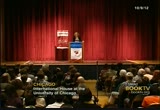tv Book TV CSPAN November 24, 2012 7:30pm-8:45pm EST
7:30 pm
20,000 words. that's a huge gap. unfortunately, in this country we never close that gap. so we need start early, and then we need to be ready to really pour the resources as jane discussed in to the earliest years of children being in a school setting where we can try to reach them best. >> carol, is president and ceo of reading is fundamental. mrs. roscoe. what's your website? >> rif.org. >> and jane robinson is chief financial officer of first book. and the website? >> firstbook.org. first written out. >> we thank you both for being on booktv and talking about your reading programs. >> thank you. >> thank you. >> you're watching booktv. up next martha us nos balm talks
7:31 pm
about anti-muslim bigotry in the west. this is just over an hour. [applause] >> well, thank you very much, mark, for that great introduction. and i want to thank the seminary coo open for making it possible and also especially thank you for being here. i'm overwhelmed to see so many people. because my main hope is to engage with you and spend at least a half hour on q & a, i'm going speak briefly and what i'm going to do is introduce the book in a general way and focus on just one section about the bands in europe. once, not very long ago, americans and europeans prided themselves on their enlightened attitudes of religious toleration and understanding.
7:32 pm
although everyone knew that the history of the west was characterized by intense religious animosity and violence including such bloody episodes as the crusades and the wars of religion. but including as well, the quiter violence of colonial rebelling use domination by europeans in many parts of the world and added antiseminism and -- the gnat disifm which implicated grerm any and many other nations. europe and the u.s. until very recently liked to think that the dark times were in the past. and that religious violence was somewhere else. in society's more allegedly primitive, less characterized by heritage of christian values. today we have many reasons to doubt that come complacent self-assessment. it calls for critical self-examination as we try to uncover the roots of ugly fears
7:33 pm
and suspicious that currently disfigure all western democrats. in april 2011, a law took affect in france according to which it is illegal to cover the face in any public space from parks to marketplaces to shops. although the law does not mention the words women, muslim, boar can, or even israelied, it was introduced by president as a ban on muslim vailing which according to him imprisons women and threatens french values of dignity and equality. the new law rear renders. have adopted some type of restriction. on april 28, 2011, the belgium voted far similar ban although the law is expected to be challenged before the
7:34 pm
constitutional court. in spain, in 2010, the say -- in all public places reversing an earlier vote supporting the ban. similar laws in progress in italy as well. in switzerland, after at campaign designed to aappeal to fears of the muslim takeover. a popular referendum voted by 57% to ban the construction of -- [inaudible] associated with the mosques. despite the fact that very few mosques in switzerland have them. they are only four in the whole country out of 150 mosques. and that in consequence, the architect issue is clearly symbolic. in july of 2011 terror struck northern europe. there was approximately 76
7:35 pm
people murdered. and buildings attacks. anders who confessed to the crimes but claims hey not at fall. policed on the day of the attack a 1500 page manifest tow he outlined a they arely based on the idea that europe must fight. he ties with a variety of antiislammic groups in europe and the u.s. go in to that in the book. in the u.s. the legal side so far is somewhat better yoking to the long constitutional heritage of welcoming religious dissenters who expression their commitments by dressing in nonstandard ways. no bans on the head scare of are proposed. but? been a number of attempts to use zoning law to force out mosque including locally here in this
7:36 pm
county. and some ill craft proposals to forbid the application ofsha rei ya law by u.s. courts. yes, there has been, as you know, horrific violence. the recent attack on the temple in wisconsin that left seven people dead. the perpetrator seems to have been influenced by hate sites very much in the manner of anders. my book argues that political philosophy can help us think about how to deal with the time of fear and suspicious. what i advance in the book is that three-pronged approach. the first prong is good constitutional principles based on sound arguments derive from the idea of equal respect for human dignity. are here i studied the history of debate about religious liberty including the idea of roger williams and john locke, and then i look how the ideas about equal respect for conscious and the burdens that imposes on government and public
7:37 pm
policy throed a constitutional tradition according to which government may not substantially burden an individual's free exercise of religion without an extremely weighty public interest. i defend those ideas as a good basis for public policy in other nations as well. a second prong of my approach, on which i'll focus tonight is the need for principle consistency and self-examination in our approach to the religiouses of other people. i note that many policy in this area lack self-examination. the basic virtue of trying to have a coherent and consistent policy across similar cases. and many are flawed as we see soon in a deeper way. a way that lies at the heard of ethics namely people act in ways that give their own group special privileges they refuse
7:38 pm
to apply the same law to all people. so we'll go on and see that. but finally, the third prong of the approach, i argue that even when we have good principles and consistent reasoning we still need something more. and active with, curious imagination interested in learning about the lives of others, and in coming to see how the world looks from other points of view. i give examples of works of literature for both adults and, and i think particularly important children that promote the sort of understanding. throughout my comments throughout the book is that i use the history of prejudice deuce against jews in europe about a historical case that is good to think about as we face the prejudice against muslims. antisemitism has many of the same unfortunate features and the obvious wrongness in light of history may guide us as we
7:39 pm
think about issues that are perhaps too close to us to be seen with the clarity they deserve. but now, two the second prong and principle consistency. i'm going focus on the bans of the borka, the arguments made there can be adapted to other cases. what i'm now going argue is that the five most prominent arguments in favor of banning the and burden minority practices. and thus in turn, they're not exat wall with the deeper underlying idea of equal respect for all people from which that principle springs. indeed all the cases what we might as returning the christian tradition against its call cases of seeing the mote in your brother's eye while failing to appreciate the large plank that
7:40 pm
in your own eye. for all target situations, alleged to be present in muslim communities, while failing to note their ubiquity in a far worse form in the majority culture. let's look at each argument asking if each treats all citizens with equal respect. first is an argument from security. it holds that security requires people to show their -- face when appearing in public places. a second closely related argument which i'm going treat together with that, says it's called the argument from transparency. it says that the kind of transparency of res process proper to relations with citizens is impede bid covering part of the face. what's wrong with both of these argues is that they are applied totally inconsistently. as you all know or soon come to know if you're new here. it gets cold in chicago. and we walk along the street,
7:41 pm
and i certainly walk hat bulled dover and scarf wound tightly over nose and mouth and often sun glasses to keep the wind out. no no problems of either security or transparency are thought to exist nor are we forbidden to enter public buildings. many beloved and trusted professors cover their faces all year around. surgery, dentist, american football players skiers. the latter wear a full face covering with slits for the eyes. similar to the -- that's a wide spread view in the u.s. and europe. i can say is that if i were a
7:42 pm
terrorist in the u.s. or europe and if i were not stupid, the last thing i would wear would be a boka. criminals usually want not to attract suspicious attention. i think i would dress like martha in the winter. a down coat, hat down over the eye brows. extra hood and large sunglasses and a indian shawl wrapped around my face. never the less, i have never been asked to remove the clothes in a department store, a boutique, a public building or in the bank. in the summer if i were intelligent i would wear a big floppy hat and i would carry a big hand big. that is what a smart terrorist would do and those are the ones we need to worry about. so what do to scare do about the threat that bulky and
7:43 pm
nonrevealing clothes creates? airline security does a lot with metal detector body imaging pat group and so forth and i think so long as done consistently. that's perfectly all right. one system i like is in place in india all passengers get a full manual pat down in a curtain booth by a member of the same-sex who is clearly trained to be courteous and respectful. private stores or other organizations who feel that the bulky clothing is a theft whether of shoplifting or terrorism could substitute a rule banning floor-length coats. they could have a body scanner the the door. but they don't presumably preferring customer friendliness to the extra margin of safety. what i want to establish is the discrimination inherent in the belief that it poses a unique security risk. reasonable security policy apply to similar cases are perfectly
7:44 pm
fine. a reasonable demand would be that a muslim womb -- woman have a full face photograph with suitable protection for modest i did during the photosession such a photoshould be required and most islamic scholars grow. i don't think it would be incompatible with equal liberty. however, we also know by now that the face is a very bad identifier. at immigration check point bs, eye recognition and fingerprinting technology have already replaced the photograph. when the superior technology are broadly available and proceed to police on patrol and airports security lines we could do away with the photograph hence with what remains of the first argument. we still need to say a little something more about the variant of the argument that focuses on transparency. i have already begun to reply by pointing to the many content in civic life which we make impact
7:45 pm
other citizens waving to them along the street. we can add two further points. the first is long standing tradition hold that the eyes are the windows of the soul. contact with another person is thought to be made through eyes than through nose and mouth. once during a construction project that involved a lot of dust in my office, i actually had to cover everything but my eyes while talking to students for a longish number of weeks. i put on glass to. they found it weird. then they were asking me how they could get a mask and a filter scarf. my personality did not feel stifled nor could they feel they couldn't access my individuallity. the point i would make here is that people have differentty talking to people who look odd. and there's an unfortune human
7:46 pm
tendency to blame this on the who looks odd rather than oneself. people with facial disabilities or hugely styingtized in most cultures. people with both mental and physical disability are often excluded from conversation. indeed, children with disabilities used to be as we know hidden away from so-called normal children in a separate room not integrated in to mainstream classrooms, partly on the ground that so called normal children found difficult to interact with them. today we still have difficulty with this. when we in the law school admitted our first student with major disability. she used a wheelchair and needed a dog to guide her because she was legally blind, people didn't talk to her at first. they thought she must be stupid. that's very common. and then, of course, they quickly discovered that she was a star and not only a star but a very gifted actress who starred
7:47 pm
in the law school musical and so this changed. and in general, now in instructors at least intellectually aware they should not include people from conversation -- not exclude people in conversation. if the person finds it hard to talk to such a student or colleague, she'll blame that the that's not on the person but herself and she'll try to do her job better. in the process, we are learning to make human contract through a greater variety of modality. promise ineptly through the voice in the case of my student who was legally blind but in many other instances as well. a third argument very prominent today is that the borka is a symbol of male domination that symbolizes the objective indication of women.
7:48 pm
to treat a woman as a object for the use. the first thing, i think we should say about the argument subpoena the people who make it don't know much about islam and would have a hard time saying what symbolizes what in the religion. but the more blaring flaw in the argument is that modern society -- with images of male supreme sei that treat women as sex object. sex magazine, hard core pornography, traps parent or revealing clothing, all of these products, one might argue and it has been argued treat women as objects as do many aspect of the media culture. women are encouraged to market themselves for male objectification in this way. it has been observed by feminist this is a way of robbing women of agency and individuality reducing them to commodities. i have written several article
7:49 pm
on the topic myself. the latest was about the pornographic abuse of women on the internet. what about the places -- plastic surgery? every time i undress in the locker room of my gym, i see women bearing the scars of plastic surgery. some taken a personal choice a lot undertaken also by the pressure of the gender culture around to conform to a male form of female beauty that cast women as sex object. it's the proposal to ban all practices concerning which the ministry of feminism concluded they object if i women. it would be consistent although few including a few feminist would endure a sweeping restriction of liberty or the authority would invest in a small number of alleged feminist
7:50 pm
experts. but it's not made consistently. proponent of the ban do not propose to ban the object fying practice. they strongly object to even the radical feminists who would like to ban certain kinds of violent pornography and they participate in the practiceses. once again, out point of the borka are utterly inconsistent portraying a fear of the different that is discriminate story and unworth of the did democracy. in effect they arrogate to themselves the sufficient of the ministry of feminism. point very well made by joan scott in the book about france. but only for certain people. the real motive understanding the particularly likely not to understand clearly not their own sort. the way they deal with sex i. in the case and all by persuasion and example, not by removing liberty. of course, things that are legal
7:51 pm
can still be disapproved of. what i'm arguing is that equal respect for persons requiring equal public condition of liberty. of course, it doesn't require equal personal approval of all religion practice pings. many things are legal that most would consider deplorable. unkindness, indifference, incivility and are in schism. in a society based on equal republican people with one view remain free to disapprove of some religious practices or even of a all of them and religion itself. and to express that disapproval. still, i think such a person still ought to think at least about consistency. and i think a duty of civility suggests that she ought to at least try hard to understand one should listen to what women who wear it think they needs before opining and in general would
7:52 pm
should he before -- it's rather like the way people come up to a pregnant woman and start talking about their pregnancy. it's not very pleasant app forth argument that women wear it because they are cohearsed. it's a rather implausible argument to made. it's made by people who have never investigated what this circumstances are. we should reply that all forms of violence and physical coerce are illegal already and the laws against domestic violence and abuse should be enforced more deal lousily than they are. they do they really believe that dpliels domestic domestic violence is a muslim problem? if they do, they are not right. according to the u.s. bureau of justice statistics intimate
7:53 pm
partner violence made up 20% of the fatal crime in the year 2001. the national violence against women cited that 52% of surveyed women said they were physically assaulted as a child by an adult caretaker and or as an adult by any type of perpetrator. there's no evidence that muslim fan families -- have disor nate violence. given the strong and documented -- and the abuse of alcohol one might predict that observe end muslim families would turn out to have somewhat less of it. suppose there were evidence that the it was strongly associated statistically with violence against women. could government ban it on the grounds? the u.s. supreme court has held that new -- in indiana this is an interesting case if you look it up later.
7:54 pm
barns v. glen theater. new dancing may by barned in the bar in indiana count of the association with crime including justice said crimes against women. but it's really not clear this it was correct. it reversely -- were not very -- they weren't there. he made an assertion that new dancing is connected with crime and somehow that presence of pasties and the g string would change that. it was unplausible. i think he did not have much experience in the area. [laughter] but anyway, now college fraternities are very strongly associated with violence against women. we know that. there's lot of evidence of that. and some universities have made all or some fraternities move
7:55 pm
all campus as a result. but private institutions are spite latitude and longitude to make such regulations about what can occur on the premises. public universities are spite latitude and longitude to limit the type of activity that give public money when it involves underage drinking. a eat it l government ban on the fraternity or the male drinking club or other places where men get drunk such as soccer matches, would certainly be a very bizarre restriction of association of liberty. one thing that we have learned to be strongly associated with violence against women, as i said before, alcohol. the amendment to the u.s. constitution banning alcohol was motivated by exactly that concern. it was on dubious footing in terms of liberty. why should law abiding people suffer for the crimes of abusers. what was obvious is that prohibition was a total disaster politically and practically. it increased crime and did not stop violence against women.
7:56 pm
more over, even during prohibition, religions that required the use of alcohol got an exemption. so the correct analog would be a ban on the borka who wear it for religious religions. which is to say all who wear it. what's most important, hour, is that anyone proposing to ban it must consider it together with the other cases. weigh the evidence and take the consequences for their own cherished hobbies. what about children? anded a lens sents surely they don't have much choice so long as they are living with their parents. family pressure to wear religious dress is likely to be difficult to resist. this question, of course opens up another huge topic since there's nothing that is more common in the modern family than strairs forms of cohearsive emotional pressure to get to a
7:57 pm
top college, to date people in the so-called right religion or race, to wear appropriate clothes to be use a career, to take a shower, and so on and so on. i should say that my own father, who was a racist from the deep south, while we were living in philadelphia told me he would disinherit me and not pay for my public education if i appeared in a group that had a african-american. it was pressure. there's a lot of that. where should government and law step? certainly it should step in where physical and or sexual abuse is going on. which is very often. then it's much tougher to talk about the emotional coerce. and i actually think that as bad as my father's practices were it probably wouldn't have been right to remove custody or do
7:58 pm
something else like that. where religious mandates are concerned intervention would be justified where the behavior either institutes a gross risk to bodily health and safety. or impayers some major bodily functioning. thus i think that female genital mutilation practiced on minors should be illegal it impairs sexual pleasure or other bodily function. the christian science belief they should not be taken to the doctor when they are ill has been litigated successfully. some forms of so-called alternative medical treatment have lead to abuse and neglect con conviction. it in every case, and again, i think it's important treel treat all the cases together. what is going on is my two-sided balancing test is there a substantial burden on the parent's religious freedom and if so does a compelling public
7:59 pm
interest justify the imposition of the burden? so now the bork ?arks for minors is not the same class as genital mutilation it's not irreversible and does not endanger health or impair bodily functions. we'll get to the health argument in a minute. i'll say more about that. it it's imposed by physical or sexual violence. it ought to be legally punished. otherwise it seems to be in the category of all sorts of requirements pleasant and unpleasant that parents impose on their children. some practices of this type do appear to violate laws against child safety. thus when law professor abe ma of the yale law school admitted in the popular book "tiger mother" she forced her daughter to stand outside in the cold without supper and on occasion forced to stay on the piano without bathroom access because she hasn't mastered.
8:00 pm
i think it was child abuse one did wonder why the police were not on her doorstep. the answer was obvious. she was upper middle class yale law professor. i think, you know, that's the sort of thing they could intervene. if similar tact is were used to get a girl to wear something that would be -- they more like emotional black male like my father or maybe even less dray cone can than that. to bring the police in all such occasions would be to count too much legal intervention in the affairs of the family. societies are certainly spite latitude and -- entitled to insist that all female children have a decent education and employment opportunity that give them exit options from my home situation they may dislike. i think that's extremely important. ..
8:01 pm
8:02 pm
is the fact that some people actually choose lives involving authority and constraint, given that the u.s. in most european nations have had volunteer armies for some time and germany just dropped its own conscription law. all countries have reasonably grateful for the fact that the preference for a structured life submitting to authority runs relatively strong in their societies and most do treat the choices of the men and women of the military respectfully rather than suggesting such should be banned. people should not demonize some laws that involves addition to authority and extol others unless they can find a relative difference. the u.s. is worth the sacrifice of economy but religion is not? many people to believe something like this but it seems nosy and read to make such judgments about strangers. finally, wet and frequently hears the argument that it is
8:03 pm
per se unhealthy because it is hot and uncomfortable. i remember the first time i was in barcelona and i had just been very uncomfortable with the sun. it's like a weapon and i had very fair skin and i didn't have enough covering so anyways this woman who is absolutely burned to a crisp and i was worried about the state of her skin, she made this point that the burqa is unhealthy and seem so paradoxical. [laughter] clothing that covers the body can be healthy or unhealthy, comfortable or uncomfortable depending on the fabric. people in india know and as i know when i'm in india the covering made of cotton is a very good choice in the heats because it's very comfortable, breeds easily and it keeps dust and at least some of the rays of the sun off of one's skin. it surely clear that the amount of skin displayed in typical
8:04 pm
u.s. female dress would need a dermatologist approved lenin fact i'm paying the price of years of not thinking about that. i need to be checked by a dermatologist every few months now. but more pointedly with the arguably , uncomfortable and unhealthy female clothing. why do we have to begin with high heel and platform shoes as delicious as they are an enjoyable and lovely as they are but now high heels are associated with majority norms in major spanish, italian and french exports so they draw no ire. in general the state is right i think when it limits its regulatory interventions into clothing to making sure that clothing sold to children is flameproof and without harmful chemicals and that other gross health risks are avoided that on the whole, women in particular are allowed and even encouraged
8:05 pm
to wear clothing that may in some way create health risks and what is important is information and education into them people make that choice. so, all five arguments it turns out are discriminatory. he don't even need to reach the delicate area of whether religion should get special accommodation to see that they are unacceptable and a society committed to equal liberty. philosophical principles shape constitutional traditions and the laws that are shaped by those. i tried to just give you a flavor of some important principles behind traditions of religious liberty and equality in both the u.s. and europe, but then what i say in the rest of the book is that even if we had the right laws and public policies, the danger of narrowness and narcissism is so
8:06 pm
acute and you can see it in these arguments, that what we also need in addition to good laws is the cultivation of the imagination, the curiosity and the non-obtuseness that leads us to really think of others as full human beings whose lives are curious and to pursue that curiosity as fortunately the university of chicago gets used so many wonderful opportunities to do. today, a climate of fear and suspicion directed particularly against muslims threatens to derail these admirable commitments, but if we articulate the ideas clearly and see the reasons for them, this may help us oppose and contest these developments. thanks. [applause]
8:07 pm
so, i will call on people and we will go on until they cut us off so please come to the mic. then, i think i will hear you anyway but i think other people want hear you if you don't come to the mic. please say who you are and if you are from the say what program and what year you are in. and then after that, we will be doing book signings but if anyone has to leave and you still want to get a book, bring up by my secretary and i will sign it sooner or later. yes? >> one thing that disturbs me that young girls who want to
8:08 pm
wear coverings and are not allowed in france, they are forced, they cannot go to a normal school and they have to have special schooling. so they may be deprived of the education some of the other children get, which would be a problem for them finding jobs in the future or being equal. >> yeah, thank you. i think that's very important. of course that shows you in so many ways policy is counterproductive. what you want to some degree of assimilation and mingling and then of course as you say it militates against that. i didn't talk about the schools where headscarves -- not just the burqa but the headscarf is bad and that is especially clear in the case of inconsistency because the yeah off for the jewish, the headscarf for muslims but then nothing for christians because
8:09 pm
well, they say large crosses are banned but no christian is required to wear a large cross so the appearance of symmetry, there is no real symmetry. now france is a special case in the following respect, that they have taken a principled stand that the public space should not have religion in it, so they preferred naïveté to religion. so that takes a few extra steps before we see what is wrong with the burqa and i think we can easily see the inconsistency in treating different religions differently. the burqa, know whether religion has accustomed precisely that sort so to see it and consistently really have to read the text of the law. now i don't like the french policy anyway because i think it privileges non-religion over religion and virginia for a while said we are we are going to fund all student
8:10 pm
organizations except for the religious one because we don't want to be a sponsor religion. it was overturned by the supreme court on the grounds that why should religion be treated differently? it also shouldn't be disfavored. i preferred that talents to the french one but if you want to see how they are inconsistent, if you read the law you find out that in the law there is a long of exceptions and occasions when it's okay to cover your face. they put on this list everything except the ones they really want to get at and they include even masquerades, and then it goes on and on. reasons for sports and so on so everything that i mentioned in my talk is on that list someplace except for the burqa of course. so i think that is just malicious and inconsistent.
8:11 pm
but it's against the backdrop of an idea that we are just going to decide what the french way of doing things is and as you say, even if they have an idea that the french exist and in jones gotts book i've recommend, it's a very good treatment of fact, still they are not going to get that. they are going to get exactly the opposite so yeah, absolutely. >> per furley chicago used to have an ordinance against appearing in public with a mask and i believe it was directed against the ku klux klan but aside from that, i am interested in a related issue which is polygamy. for instance, do you think reynolds versus u.s. which polygamy among the mormons is good law and is ever going to be overturned? >> yeah, thank you. that is interesting issue.
8:12 pm
by the way chicago also used to have laws against appearing in public if you are ugly and it would upset people. [laughter] i had a former colleague with a major neurological disabilities who had researched it and he found he was not able to walk down the street. but anyway, polygamy, you know the thing is if a religion came forward today with with the genuine religious requirement of polygamy as was the case in the church of latter day saints in the 18 70's, i think it would be very hard if the regime were no substantial burden without a compelling stage. that is not the legal regime now for confiscated reasons but it should have been i believe. so what was the compelling state interest? if it were limited to men marrying plural wives,
8:13 pm
absolutely. there is a case where bob jones university tax exemption -- lost its tax-exempt and because the court argued there was a compelling racism so very civilly they shouldn't collaborate on the oppression of women however a practice which was plural, what was the objection to that? of course it's administratively impossible because it creates just so many layers of families and former families but in fact, in our legal tradition administrative difficulty has to be really, really extreme to be a compelling state interest. in one case that i know of where a case where of native american family refused to have their child given a social security number and they said that was so fundamental in having an organized society. now turned out that she had no reason given anyway so the case was very odd in that respect but
8:14 pm
anyway that shows you, you have to go very far out on a limb to trump the religious claim. then you asked about reynolds. reynolds is a case in the 18 70's where a polygamist mormon man lost. it was the first case to test the reactor size clause simply because it was not apply to state law yet and therefore only the territories were under the direct control of the u.s. supreme court and they thought they would win, and they should have one. certainly as argued he had a very good case. it was terrible bigotry and in fact racism. this guy, there was a scholar who was a political scientist who wrote that mormons were african and, i mean it was really full of rachel tropes against the evidence of their senses. you would see these descriptions circulated at that time which
8:15 pm
said, the and all these things combined with certain features that mormon males actually do have like the square jaws and tall height and so on so the whole thing was a mess and it was full of hideous racism and they actually said polygamy is a patriarchal institution. well, what did they think of monogamous marriage in the 1970s? the only difference between women and polygamist and monogamous marriages is women and monogamous marriages could vote because they have the vote in the territory and women and monogamous marriages didn't have above but of course the lack of divorce on the grounds of cruelty and all these things that were present in monogamous marriage at that time this judge didn't even bother to mention. so i think that case was a terrible mess and today, there would be a very strong interest in protecting gender equality.
8:16 pm
but polyamory, i think if there were a religion -- it has to be a bona fide religion because when you get some weird claim particularly in the drug area, people are always making up new religions and the court, you know, even though they would on the whole prefer to allow the person sincerity to define the religious claim and whenever it's a matter of where you are skeptical of the motives, they fall back on a tradition and on the presence of a recognized group. so if there was a recognized -- so i mean if the mormons today to decide once again that this was a religious requirement, of course they are very far from doing that and i have difficulty with my mormon students even teaching that history because they have been taught from a very young age that it's extremely unfortunate and that
8:17 pm
they should repudiate it very strongly and so on. but, if they ever did change on that, mainstream of the religion, this fringe sect that engaged in child abuse, then i think it would be very hard. the court could probably find something but it would be hard to do. >> hi. thank you very much. i thought your talk was great. i wanted to ask a question. seems to me like one of the things that it's important and framing this conversation is whether or not it's an external requirement of a person to wear a burqa or an internal decision to wear a burqa? i think back to the star of david that was required in nazi germany and there was an external application by others for the jewish to wear a star of david. so when we think of islam and we think of muslims, is at all one
8:18 pm
internal group or do we think of that as two groups, men and women and is there an external application in force by one group subjugating the freedom of another group i.e. the men and women? so is it really a question of not islam versus islam or is it a question -- do we have an obligation as a society to protect the freedom of all including subgroups within other groups? >> thank you. that's a very thought full and wonderful question. i am talking about liberal democracies, the u.s., europe, turkey and someone that i am not talk about countries that are tyrannies which imposed islam by force, so that would be a totally different question. it's even possible that a so-called democracy and for example it might be possible that egypt might impose some restrictions, done by some kind
8:19 pm
of democracy, so i think first of all i'm a strong constitutionalist. i think there should be fundamental rights that are defined and equality of each human being and that they should be entrenched and they should not be such that a majority can vote them away. and so we have a system of that sort and we are already head and i think the countries where talking about all have that sort so what we are dealing with in those countries is the kind of external imposition done by parents, by peer pressure and so forth. now then, think it's perfectly fair to say that it's in the same case exactly as my father. of course i didn't have quite such a racist community around me because we were in the north but it was pretty racist. you know, no one was helping me
8:20 pm
have my social life the way i wanted it. in fact i couldn't even go to a dance at a public school much less african-american. so i think you know, that is external. it didn't define who i was. i was in a democracy and so think on this i did go to college and then i got to go where i wanted to go and converted to judaism and i met all the people that my father didn't want me to meet. so i think that is what happens or it can happen in a real democracy where there is freedom association and women are given a certain strong educational and employment opportunities. the unpleasant of the parental or peer coercion can be it's not going to doom them forever. what is much more worrisome of course, as your question suggests, is when it comes from the state and of course the
8:21 pm
rules came from the state all over our country. that is where jim crow was, the state-sponsored external regime that interfered with individual choice across-the-board. so it was absolutely imperative that we get rid of that. it's a case that as late as 1967 got the supreme court today to pay on the law to overturn the law to end intergenerational marriage. the case of two people, the case is called loving versus virginia, but richard loving, a white man, married an african-american woman and they married a choice. but then, they clamp down on them because they got married in colombia. they lived in virginia and the police came into their bedroom where they have their marriage license hanging over the bed and they arrested them. so you know that is what you are talking about. that i think in our country, it
8:22 pm
has happened on grounds of religion in certain times and places but it's much more often happening across-the-board with the jim crow regime where race is concerned. so yes we should get rid of all of that kind of external coercion that impedes people from exercising. the court and said their fundamental right to get married, and of course another instance of that, they were struggling about now is the struggle of to get rid of an impairment of their ability to exercise the right to marry, which i do believe is a fundamental constitutional right that they have. so that is the kind of external coercion that we should be struggling against. if a woman were in that situation with regard to the burqa, but it's hard to imagine exactly what the situation would be because societies are not telling these women they can't go to school. they are not telling them that they can't --
8:23 pm
so i think with the french and the european situation does is to deny them certain avenues of employment and education as the first question a rightly said. so that approach is external coercion. if we get rid of that, then what we are left with is parents, friends, the community and that is often quite bad but at least we can deal with that under constitutional liberty. >> i am lil sullivan, grad student in the -- department. i just wanted to ask how you apply your system in light of -- [inaudible] >> okay, first of all there is a furious parallel, and i don't suggest you are making it, between female mutilation and
8:24 pm
male circumcision and it is serious because female titillation is practiced in much of africa. it first of all is very extreme and impedes in some forms all sexual pleasure but then there are many common warms that impede also painless and all kinds of things associated with many health problems. male circumcision seems to me not to be associated with health problems or diminution of sexual pleasure and people cannot imagine -- but i think the real truth is that there is certainly no evidence of a health problem and in fact contrary, that it retards hiv/aids and therefore does the zulu leaders in south africa have been urging circumcision for that reason. but on the pleasure front, i think there is no reason to
8:25 pm
think there is an impediment. what i think the germans decision was all about, and they didn't even reflect it, that this jewish would get upset about this, i think then what they say is there is pain inflicted on the baby and it is true. there is a little bit of pain in the process. okay, so then what should we say about that? i guess i do think that the u.s. courts that are trying to ban on the form in which the rabbi must touch his mouth to the incision, that is quite right to have trouble with that because that can spread. that was the whole point and so a lot of rabbis are willing to substitute a different form for that reason. i think that would be okay to help them out, but the ban on the grounds of pain, well, are they really going to do that
8:26 pm
consistently? lots of little girls get their ears pierced. in fact in some ethnic groups, it would just be routine that when a girl is two or three should get her ears pierced. well, getting your ears pierced at the age of two or three, a lot of people have been circumcised a newborn infant so all right if they really want to define the threshold of pain and they want to have consistent policy, they will just insist that we ban all of those things but we would really have to think very hard what all those things would be and whether this wouldn't be too great of her restriction of liberty. then, next week at the fact that this is a religious -- where is having your ears pierced to my knowledge is not a religious mandate in a religion. so should we really -- should we allow this amount of pain to trump the religious claim? i must say, i don't think most
8:27 pm
courts would see it. is certainly not any more pain than getting a mandatory inoculation and insisting on various inoculations. and even whether people should get exempted from the inoculations for religious reasons is very controversial and often the religious claim fails. so i guess i don't think the case is, even if they did sweep in his ear piercing and all other things, it wouldn't be a very strong case i think. >> hello. i am in the master of arts and political social sciences. my question is, you showed two cases, first the burqa and female genital mutilation in
8:28 pm
children. it should not be illegal for -- if i listen to you correctly. >> it doesn't come under the range of practices that are illegal because they impair health or major bodily functions. >> and on the other hand, wearing the burqa, how to emphasize -- empathize with wearing a burqa and -- with someone with disabilities. think the active taking off the very source of ambiguity that makes it problematic, i'm going to make a very generalized sweeping argument on why i think it's this way. if you look at countries like in the middle east especially turkey and egypt and vice versa, not having a burqa has been for
8:29 pm
many many years a sign of affluence. i have come from turkey and this is changing by now fortunately but it's still the way it has been thought of. so i think many people in democracies in the west have in their minds, it's kind of a wealth providing thing that goes hand-in-hand with someone wearing a burqa. on the other hand of course, i would have to say for these countries, it is i think, they are more liberal in a sense but in turkey there is much more improvement in the same of tunisia and egypt, which is pre-arab spring in fact. there are all sorts of problems about feminine concerns. i know many women who are
8:30 pm
educated in charter schools in the become staunch anti-summit sites, antiabortionists. they ultimately get consent from their husbands and brothers who commenced his loyalty to their wives and such and they are very very rich. they have their own bmws so the mentality for them is they came from medical universities and it's it, and rationality in which i can get a rich husband that i won't have to work. >> could you make it a little bit briefer because there are people behind you. speeding anyways, the ambiguity makes it very difficult especially -- >> i think it is very interesting what you say about how class plays into all this and i think it's a subtlety and complexity. no one gets to an american discussion, they just see the
8:31 pm
strange object in the don't even think about that. any way one would have to take account of all these factors but i merely only talking about liberal democracies here, and to that extent than if a woman is rich, she is ahead of the game because she has this opportunity and if she is poor she has fewer. i remedy for that would be better education and more employment opportunities. thanks. i'm sorry though. i do have to talk to the others. >> hi professor. my name is chris and i can't probably say this as well as i wrote it so i will read from my prompt. with regard to better familiarizing our children with religious difference and the importance of adhering to the principle equality principle equality and human dignity, how might we avoid fostering the sort of cultural religious cosmopolitanism and dilettantism
8:32 pm
that is part of the culture of rising cultural consumption which may come from a place that presumes superiority for the outsider and for the consumer? >> i think that is a great question because i think the thing that people in all these countries, maybe europe more than the u.s., has the most difficulty with his peoples whose lives involve constraints and some degree of anti-modern attire or behavior. and so you don't find, i mean the colts that people think of as threatening are the ones that seem incompatible with this secular modernity that seems to define for the people that democratic citizens. this is very strong in europe. when i talk in europe, believe me people say we find your views offensive because it suggests that we should move into the middle ages or something like
8:33 pm
that. i think in america, fortunately people are more willing to accept the fact that in the 17th century people came here with all kinds of strange believes and those beliefs sometimes required them to have half that they don't remove in court or to do other kinds of things. now i think it's pretty common in this country that people actually do understand this. i tell in this book a story about when i was at a soccer game at u.s. cellular field because i'm a huge soccer fan. sitting in front of me -- well first of all on one side was a middle-class father telling his daughter about how baseball was played and then there was an african-american couple who had a bag that had the logo of the u.s. state department's religious affairs subcommittee, so that was interesting. but in front of me was for orthodox jewish boys who were wearing their ritual fringes but
8:34 pm
it was under a white sox shirt so they have the baseball -- baseball clothing but then on top it was the most interesting because it turned out when the national anthem was played, they had removed their white sox caps but they had a -- underneath. you would expect in some places and i can imagine you know if they did make a lot about the flag in europe, which they don't quite so much, but the people would say you are supposed to take off your hat or here, we take off our hats. actually no one gave it a second look except for me. it was just one of these things, part of america. and i think it's deeply internalized and i and the book with a chapter about the controversy in the building of the islamic community center in manhattan and with the epigraph to the whole book is a quotation from a stripper who works in the strip club next door to where
8:35 pm
this community center was going to be built and now exists, which of course they weren't objecting to the strip club, an insult to those who love their lives. but they asked her what she thought in schieffer said well, she thought that it might be noisy but when she understood that they weren't going to have a call to prayer in aloud for him, then she was fine with it. she said, what is this all about? its religious freedom you now and i thought that gut reaction, let them go their way, it's a very healthy american reaction. how can we keep inculcating this? i think one thing is in the big city, i think it's easy to inculcate this in the city where you come across people who look different all the time. then i also talk about literature. when i was a kid i did not come across people who looks different all the time and i learned about religious minorities, african-americans and i learned from books.
8:36 pm
there was one particular author that i talk about, arcuri d. angeli who was a pennsylvania woman who wrote books about religious minorities and she particularly focused on minorities that had lives that seem constraining to the majority. one of my favorite looks when i was little was a book called meehan about a little quaker girl who wants the pink party dress is dresses that her classmates had and she really hates it that her mother is urging her to wear this grey gray and so on. then one day, it said in the period of the underground railway, the mother -- well, a woman comes who is a slave from the underground railway and she is looking for a place to hide and she spots this little girl by her quaker attire. she knows right away, this is somebody who stands up for me and would help me. so she asked the girl, can you find me a place to hide?
8:37 pm
for for the first time hannah realize that yes religion has constraints but it's about positive ideals and social justice and she becomes proud. it's a rather simple statement but it's actually a nice story because it reminds me of the one who could wear anything so long as it was brought upon -- it tells me that there is something in this life of constraint that is very principled and very admirable. so anyhow i think stories like that are actually very important. >> thanks everyone for coming tonight. >> general what about if the soviet soviet union cruiseship announces tomorrow, which i think it well that if we attack cuba that it's going to be a nuclear war?
8:38 pm
>> is such a serious thing here on our -- that we are going to be an easy and we don't want things happening now. all right, we have got to do something. >> that's right. >> in any event i would want to keep my own people very alert. >> yeah, well hang on tight. >> it's a fascinating moment. it's amazing that eisenhower tells them to have a people alert because everyone is completely on edge and of course they are alert. candidate laughs and then he says hang on tight which is a nice moment that even on this terribly tense day they are able to joke a little bit with each other and especially during thiñ crisis. i think they had a sense of how lonely it had gotten, giving all kinds of advice.
8:39 pm
you are getting good advice and a lot of falsifies which kennedy was. eisenhower knew all about faulty military advice and he was able to speak with his supreme authority about the dangers as well as the advantages of military advice. he was a very useful ally. >> we are here or here with author and journalist, america's new debate, but compromise that preserve the union. what was so great about the great compromise? >> well most people say they did know didn't know anything about the compromise and have only the vaguest recollection from perhaps junior high school that there was a crisis in 1850s. the nature of that crisis exists. the country went into the brink of civil war. most of the political culture and most americans thought the war was going to take place.
8:40 pm
the deep south was going to secede and they were much closer to secession and most americans today realize. certainly the deep south states. texas was arming and other southern states were sending armaments to texas. why am i talking about texas? there had been a collision and had were begun in 1850 it would not have begun in charleston. it would would have begun in sae new mexico. why? because texas was its own imperial ambition to move westward supported by the slaveholding south, aim to invade the new mexico territory. there were many many other parts to the crisis fundamentally. whether or not the west would be slaves or freed. in 1850, the south was militarized and southern nationalism was at a peak. jefferson davis on the floor of the senate in 1857, if the southern confederacy was to be
8:41 pm
formed now, he was ready to accept the president in 1850. the north on the other hand was nowhere near ready to go to war and indeed, the north was still dominated by the conservative wing of the democratic party, allied partially with the south. in other words the north certainly would not have fought the same more. they probably would have succeeded and the consequences of that not only for american history but for the rest of the world could have been quite tragic. >> what was the floor of congress like in 1850? >> it was tumultuous, chaotic, intense. the debate in congress was like the world series today. of course there was no horticulture in the mid-19th
8:42 pm
century. politics was the great american sport. americans came from all over the country to attend when great titans like henry clay and daniel webb -- nathaniel webster and john c. calhoun worked debating but imagine a much smaller senate chamber crowded with men who might have hated each other and were elbow to elbow with their small vests, reeking of cigar smoke, smelling of gas from gas lamps, carpet, which the tunes scattered here and there meant spitting in one direction or the other, often missing and intense, congested atmosphere with political men going monomonoe. monowith the editorial arena and indentured
8:43 pm
america. >> two of those men, henry clay and steven douglas, what was their the role of the compromise? >> henry clay was called out of retirement in kentucky to take charge of an attempt to create some kind of a compromise. he was known as the great compromise or for husbanding the compromised in the 1820s, the missouri compromise and also the 1833 compromise that brought the country back again from crisis over south carolina's nala vacation of the federal law. henry clay was a grand, remarkable man and he never once said no when he was invited to the political convention so he returned to washington and let the debate for seven months attempting to persuade congressmen from the right, the left in the south in the north to a agree to a grand
8:44 pm
compromise, a grand bargain of civil rights that was called the slavery question once and for all. he failed to henry clay was pivotal to the debate but he failed in actually making the compromise real. he had put together one of the first omnibus bills in american political history, the omnibus collapsed. >> what happened? >> steven a. douglas, the journalist at the time, a very short, ferocious northern democrat, youngest man in the senate, 35 years old, the marco rubio of his day perhaps, did what clay had not done. he did the numbers. in other words is what steven a. douglas determined was there were enough combinations of votes in the senate to pass the different parts of clay's compromise but not all at once. so he passed six
130 Views
IN COLLECTIONS
CSPAN2 Television Archive
Television Archive  Television Archive News Search Service
Television Archive News Search Service 
Uploaded by TV Archive on

 Live Music Archive
Live Music Archive Librivox Free Audio
Librivox Free Audio Metropolitan Museum
Metropolitan Museum Cleveland Museum of Art
Cleveland Museum of Art Internet Arcade
Internet Arcade Console Living Room
Console Living Room Books to Borrow
Books to Borrow Open Library
Open Library TV News
TV News Understanding 9/11
Understanding 9/11









































































